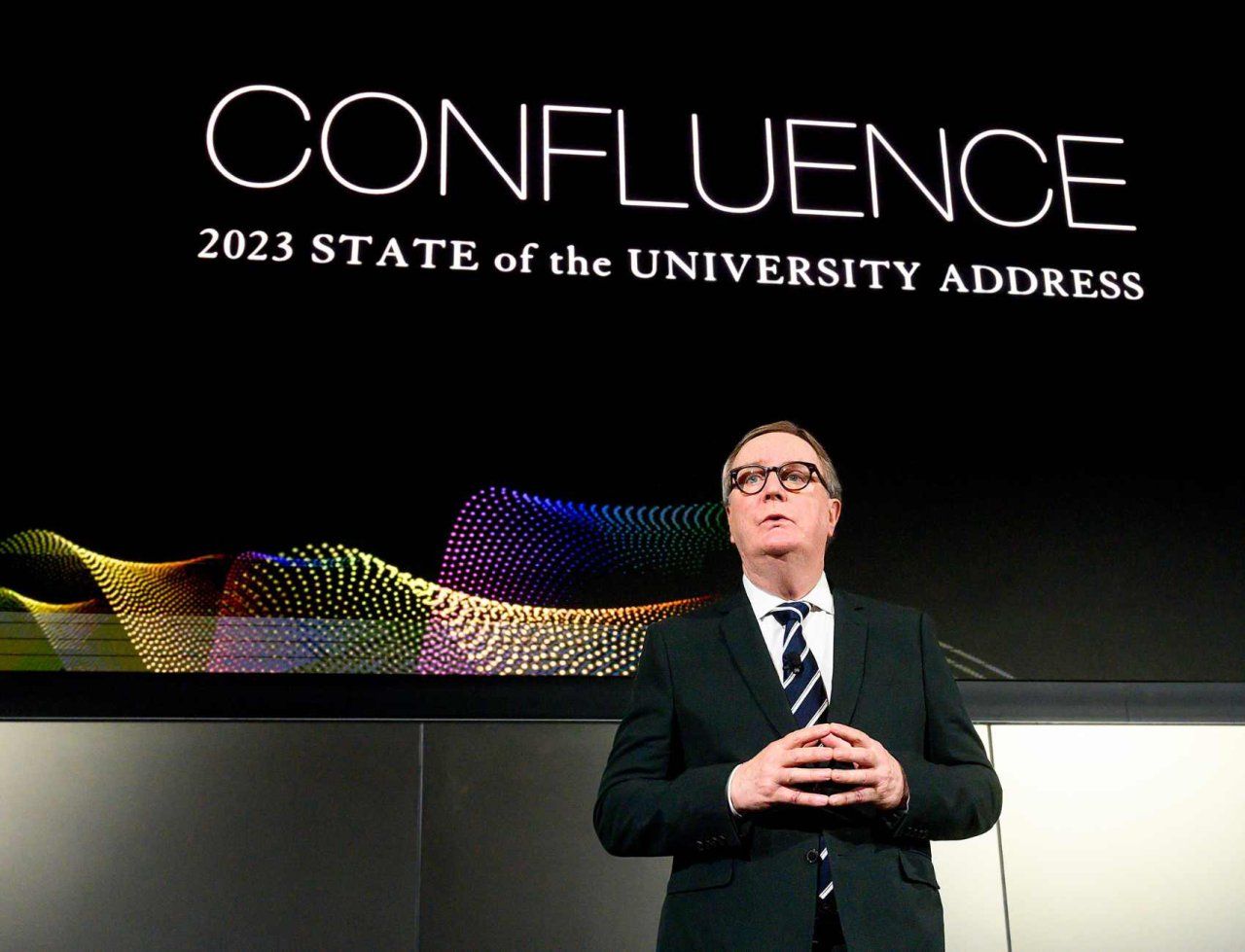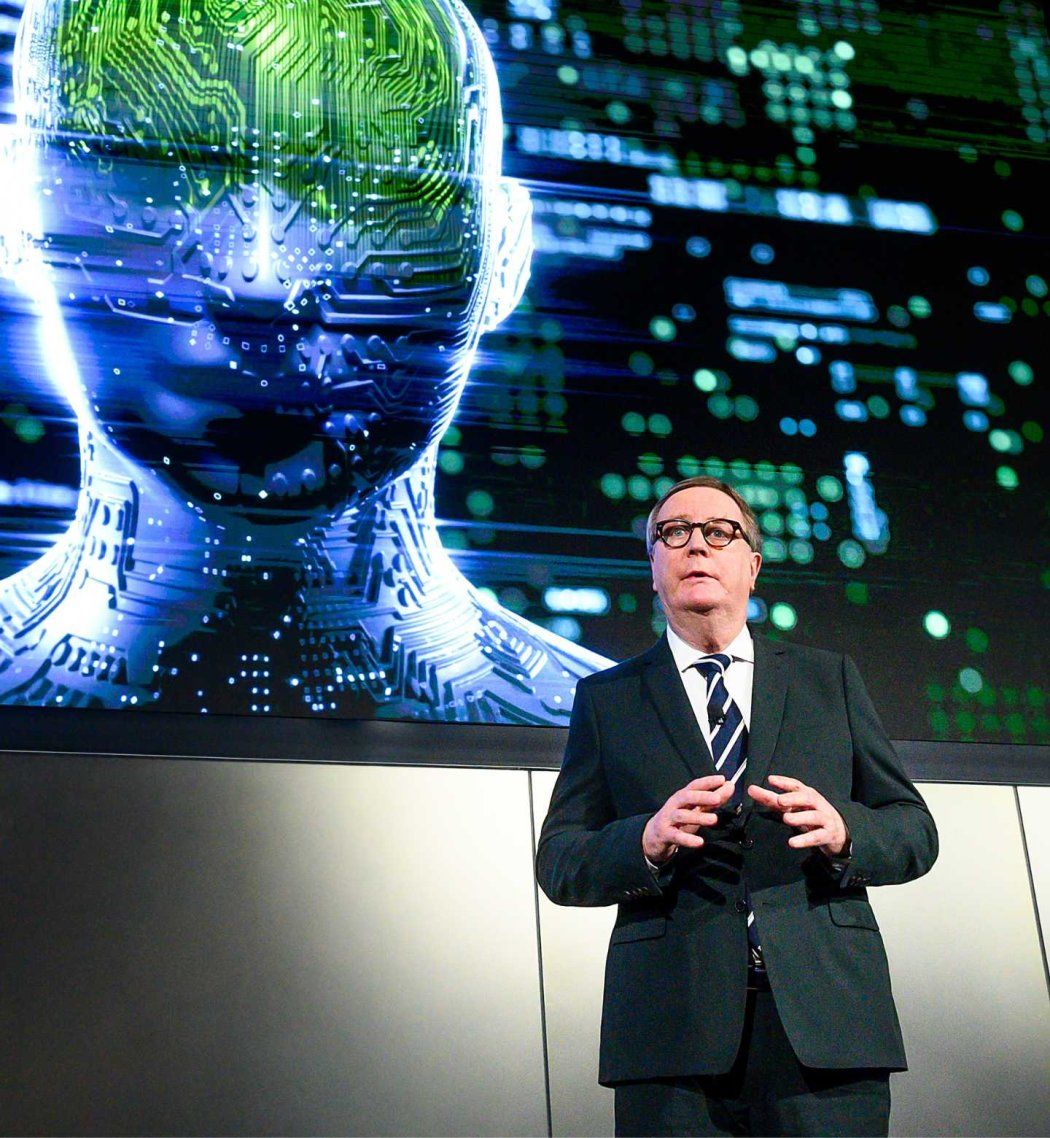UC San Francisco is well positioned to transform into a global leader in artificial intelligence enabled academic life sciences.
That was the message UCSF Chancellor Sam Hawgood, MBBS, delivered as he laid out his vision for safely, equitably and responsibly leveraging the power of AI across UCSF’s mission areas in his State of the University address on Thursday.
“Not surprisingly, it is hard to separate hype from reality and risk from benefit with any degree of confidence,” he noted. “That said, the field is highly dynamic, and it is certain that the current iterations of generative AI will be rapidly refined and enhanced. With the confluence of human and artificial intelligence, it is hard not to feel we are at the edge of a new era in human history.”
“Confluence” was the theme of Hawgood’s 10th annual address, delivered live at the Mission Bay campus. It marked the first in-person gathering for the event since the COVID-19 pandemic.
As Hawgood put it, the unfolding story of AI across the world is an important moment for UCSF to apply across research, education and care delivery. “AI in all its forms is a new boundary for us to explore,” he said.
UCSF’s place in that story was amplified in summer 2023 by Edward Chang, MD, chair of neurological surgery in the UCSF Weill Institute for Neurosciences. Hawgood highlighted Chang and his team, who demonstrated how AI helped a woman find her voice again after having a stroke at the age of 30 – the first time that either speech or facial expressions have been synthesized from brain signals to help a person communicate. “This amazing story has attracted the attention of millions of people across the globe,” Hawgood said.
The chancellor also described several UCSF-wide AI initiatives over the past year, spotlighting the challenges and opportunities ahead as the University attempts to solidify its place as a leader in the field:
- Leveraging and strengthening UCSF’s expertise in clinical AI and to deploy it at scale
- Recentering the “human touch” for patients and addressing clinician burnout
- Focusing on understanding and writing the language of biology across biological scales from atoms to organs
- Investing in the infrastructure needed for breakthroughs at a global scale and
- Addressing the risk of bias inherent in new large data models.
Hawgood underscored new partnerships with Microsoft, Open AI, Salesforce, Ambience Healthcare and others to support VERSA, the University’s new robust and versatile AI infrastructure platform.
A select number of authorized users are exploring major use cases through VERSA. The platform allows UCSF clinicians, administrators and scientists to access large language models while keeping both the model prompts and the data itself inside UCSF in a secure enterprise cloud.
UCSF’s continuing AI journey was bolstered in 2023 by the appointments of Sara Murray, MD, MAS, as UCSF Health Chief AI Officer and Julia Adler-Milstein, PhD, as the founding chief of the Division of Clinical Informatics and Digital Transformation in the UCSF Department of Medicine. Murray is leading the deployment and evaluation of AI within UCSF Health, while Adler-Milstein and her team are studying the application of AI to real-world care, using informatics to advance health equity and to address social determinants of health.
“We must ensure that AI is used ethically and guards data privacy,” he said. “We must also adopt an equity first approach and avoid adding to the digital divide that can limit access for underserved communities.”
Murray joined Atul Butte, MD, PhD, Priscilla Chan and Mark Zuckerberg Distinguished Professor, Pediatrics, Bioengineering and Therapeutic Sciences, and Epidemiology and Biostatistics at UCSF, and Tanja Kortemme, PhD, a professor of Bioengineering and Therapeutic Sciences at UCSF, to discuss UCSF’s important role in thoughtful AI use during the first-ever panel convened in Hawgood’s State of the University address.
Among the topics discussed was UCSF’s readiness to advance the AI sector.
“We’ve put into place a few pieces of key infrastructure that I think are positioning us very nicely to lead,” Murray said. She pointed to an IT platform for advanced computing already used at UCSF Health, allowing real-time electronic health records and data to be run by “any AI model type,” which then writes predictions back into the program.
“We’re actually already using that for a number of uses cases in the health system supporting our command center, where we’re getting the right care to the right patient at the right time,” she said.
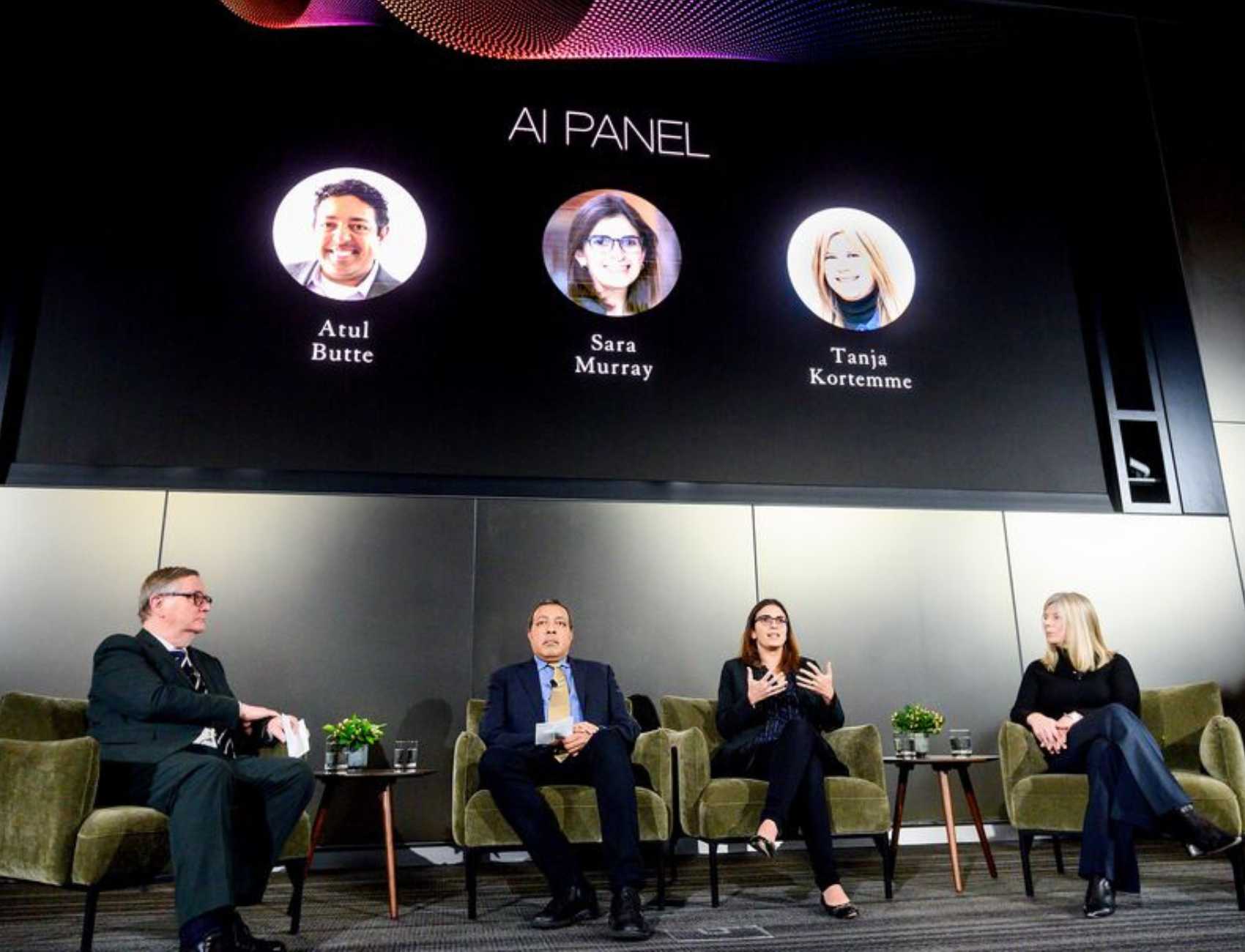
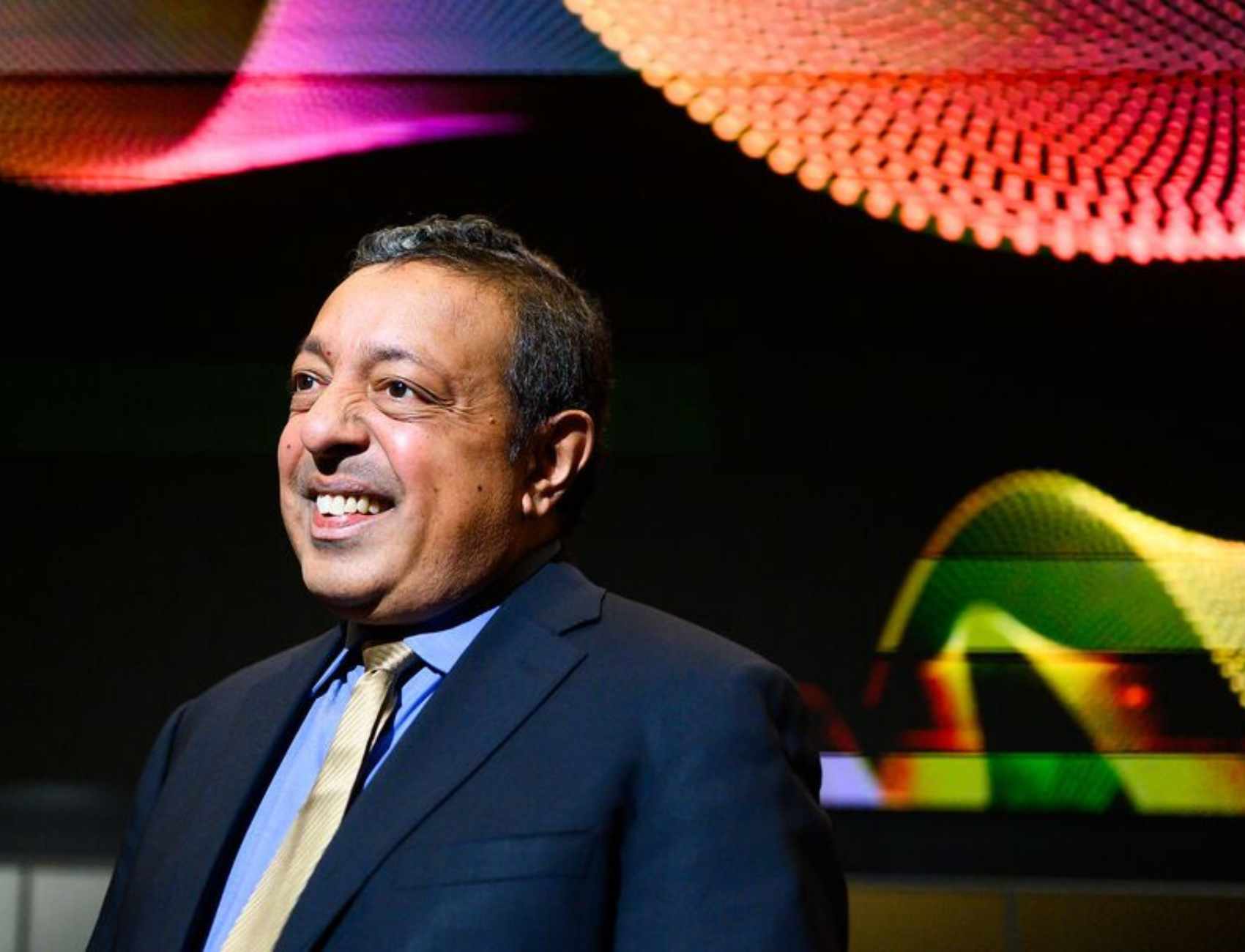
Building for the future
Hawgood touched on several other areas across the University, the most visible of which is UCSF’s ongoing physical changes – led by continued progress in the transformation of UCSF’s oldest campus at Parnassus Heights.
In September, the UC Board of Regents approved the scope, financing and budget for the new Parnassus research and academic building, to be built on the former site of UC Hall. The new building will feature state-of-the-art laboratories, a dedicated area for clinical research, new learning spaces for students and will serve as the headquarters for the UCSF School of Nursing.
Among other developments this year was the move of UCSF Langley Porter Psychiatric Hospital to the Mount Zion Medical Center, which gives way for the construction of a new hospital at the UCSF Helen Diller Medical Center at Parnassus Heights. Groundbreaking ceremonies are scheduled for fall 2024.
These projects are part of the long-term vision of the campus, known as the Comprehensive Parnassus Heights Plan.
This year, UCSF celebrated its 150th anniversary of its affiliation with the city and county of San Francisco and the San Francisco Department of Public Health at Zuckerberg San Francisco General.
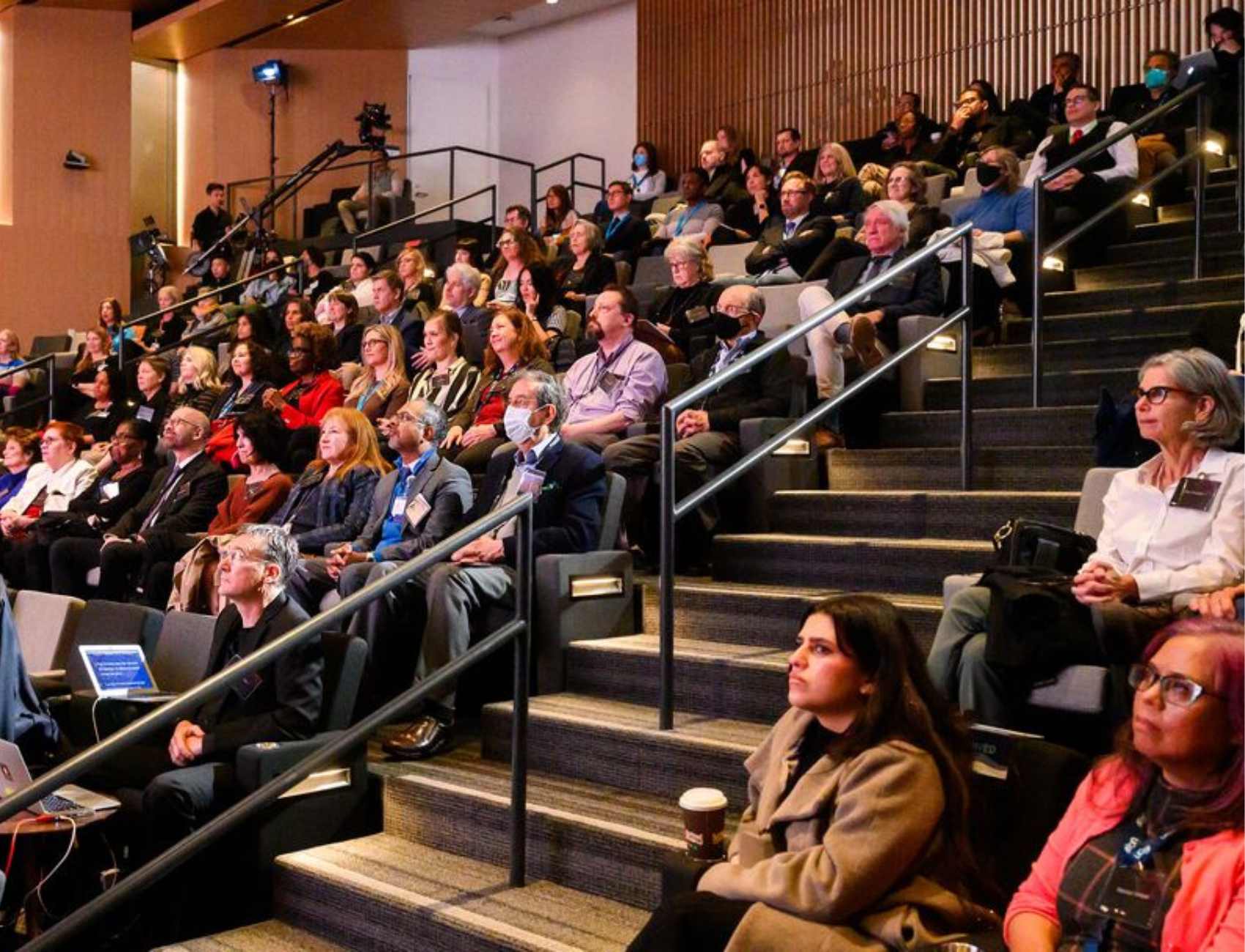
As a nod to that partnership, Hawgood singled out the September opening of Pride Hall, a new research and academic building at Zuckerberg San Francisco General Hospital and Trauma Center. “It is here where our faculty, trainees and staff will lead the way in many critical areas of public health, from infectious diseases to trauma care, accelerating the development and delivery of research-driven clinical breakthroughs,” Hawgood said.
Speaking to UCSF’s new and ongoing partnerships, Hawgood highlighted work combining CRISPR gene-editing technology with an improved understanding of genomics of our microbiome to address asthma, a condition that currently lacks successful prevention strategies.
With the support of a $70 million grant, UCSF’s Susan Lynch, PhD, Director, Benioff Center for Microbiome Medicine, and UC Berkeley’s Jennifer Doudna, PhD, Nobel Laureate in chemistry and professor of biochemistry, Biophysics and Structural Biology, are editing the genes of microbes in the gut and airways that play a role in asthma.
This work represents a very exciting possibility to develop a whole new realm of human therapeutics for many diseases based on precision microbial engineering.”
As a Bay Area anchor institution, Hawgood emphasized that UCSF is committed to creating jobs through its modernization projects, driving the regional economy and investing in priorities of the cities and communities in which the University operates.
In discussing the University’s financial health, Hawgood announced that UCSF reached a major milestone in the last year in surpassing $10 billion dollars in revenues for the first time in history.
“Our balance sheet remains strong,” he said, pointing to the University’s record for public university funding from the National Institutes of Health with $823 million dollars awarded across our four schools and the Graduate Division. UCSF has received the most funding of any public institution from the NIH for 16 straight years, and is the second among both public and private institutions in the U.S.
Addressing people and campus climate
Hawgood also took time to note the ongoing conflict in the Middle East and its impact on the UCSF community.
“The Hamas terrorist attacks and the ensuing war with Israel has been difficult to witness and process,” he said. “I have heard from many people in our community who have personal ties to Gaza and Israel, and I know how painful these past weeks have been.” Hawgood emphasized the importance of working to ensure that everyone does their part to create an environment that is welcoming for all.
Hawgood highlighted the UCSF Faces of Ability campaign as part of an ongoing focus to advance diversity, equity, inclusion and belonging. The effort to increase support and understanding of people with disabilities across UCSF highlighted several staff and faculty members.
“I am grateful for the faculty, staff, and learners who are leading the way in this work, including Chief Accessibility Officer Wendy Tobias,” he said.
Acknowledging leaders
Hawgood paid tribute to Chuck Feeney, who passed away in October at the age of 92. “I became inspired by Chuck not only by his selfless dedication to improving the world, but also by his humility and engaging sense of humor.” Feeney, who Forbes once called America’s most generous philanthropist, was one of UCSF’s greatest supporters – particularly the Mission Bay campus. Appropriately, Hawgood revealed that Campus Way will be renamed The Feeney Way in his honor.
In closing, Hawgood highlighted to two 2023 leadership additions in his Chancellor’s Cabinet: Catherine Lucey, MD, MACP, appointed as Executive Vice Chancellor and Provost in January, and Dan Bernal, a longtime member of Emerita Speaker Nancy Pelosi’s staff, who was announced as UCSF’s new vice chancellor for Community and Government Relations in October.
“Catherine has been instrumental in many aspects of UCSF’s success, including redesigning the medical school curriculum and co-chairing the Differences Matter initiative to create a culture of inclusivity and equity.”
Hawgood also acknowledged the retirements of Catherine Gillis, PhD, RN, FAAN, dean of the UCSF School of Nursing, and Jaime Sepúlveda, MD, DSc, MPH, executive director of the Institute for Global Health Sciences, thanking them for their exceptional leadership.
